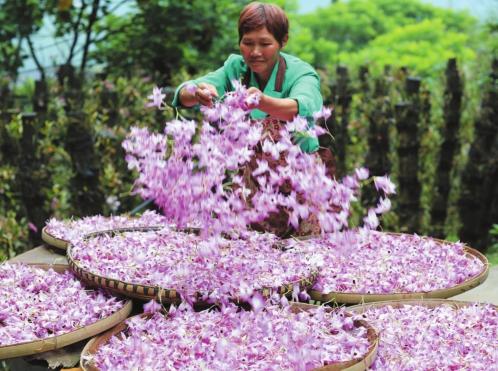Land of Hopes
2019-05-23
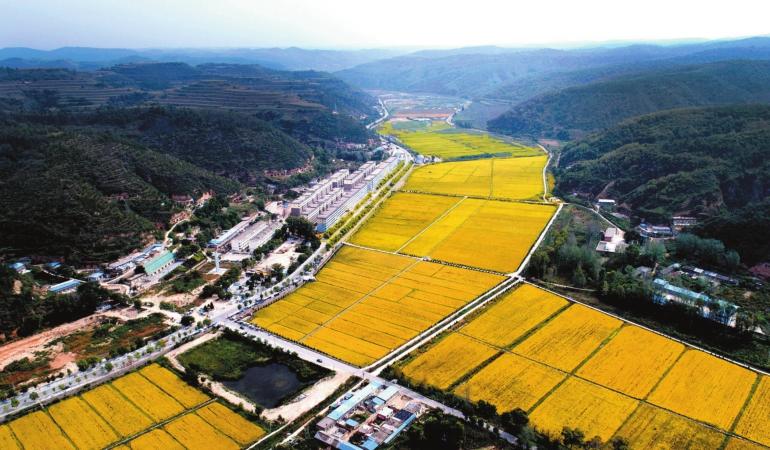
Land of Hopes
Aerial photo taken on September 12, 2018 shows the ripe rice fi elds at Nanniwan in Yanan, northwest Chinas Shaanxi Province.
Yanan, which hosted the then headquarters of the Communist Party of China from 1935 to 1948, has eliminated absolute poverty after its last two impoverished counties met the countrys requirement to cast off the title, the Shaanxi Provincial Government said on May 7.
Inf o Security
The Cyberspace Administration of China has published a draft list of app operators malpractices in collecting users personal information to solicit public opinion.
The list aims to provide guidance for app operators to correct their privacy policies and serve as a reference for authorities to assess apps and punish those found guilty of misconduct.
The listed practices of app operators include failing to remind users to read privacy policies when they install or use the apps and collecting personal information for illegitimate purposes.
Apps must make clear the reasons why they ask users for sensitive infor- mation such as an ID number or credit card number, according to the draft.
Apps are not allowed to collect personal information without the consent of the user, the draft stipulates.
The collection of personal information of users under the age of 14 without the consent of their guardians is prohibited, according to the draft.
Internet Hospitals
The National Health Commission said on May 8 that China has established 158 Internet hospitals to offer medical services, amid a lack of medical resources in the countryside and congestion in large urban hospitals.
Mao Qunan, an offi cial with the commission, said at the Second Digital China Summit that 19 provinces, or over half of Chinas provincial-level regions, have established telemedicine platforms.
The Chinese Government has also earmarked 670 million yuan($99 million) in special funds to add telemedical and other equipment in primary-level health institutions in impoverished counties.
The commission is working to realize online services in higher-level hospitals, he said.
Internet hospitals offer medical services, such as consultation and diagnosis, online. In particular, they are expected to help tackle the scarcity of medical equipment and practitioners in some regions.
Employment Promotion
The Standing Committee of the National Peoples Congress (NPC), Chinas top legislature, has launched an inspection on the enforcement of the Law on Employment Promotion.
NPC inspection teams will be sent to six provincial-level regions from May to June, in addition to inspections carried out by entrusted local legislatures in 10 other regions.
The inspection will focus on key aspects including the promotion of the law, the implementation of the employment-fi rst policy, the promotion of employment through business creation, vocational education and training, and assistance provided for fi nding jobs, fair the employment, as well as employment in the countryside.
A report will be submitted to the NPC Standing Committee in August, according to the plan of the inspection.
Water Diversion
The construction of a major water diversion project in south Chinas Pearl River Delta offi cially kicked off on May 6 in Guangdong Province.
With a total length of 113 km and investment of 35.4 billion yuan($5.2 billion), the project is designed to deliver an average of over 1.7 billion cubic meters of water annually from the section of the Xijiang River in Foshan City to Guangzhou, Shenzhen and Dongguan cities, the Ministry of Water Resources said.
One of the countrys 172 major water conservation and supply projects, its also the longest water diversion line with the largest investment in the province.
The project is a great engineering challenge as pipes will be laid 40 to 60 meters under the ground through the whole length, including 2.4 km under the estuary of the Pearl River, the ministry said.
Upon its completion in around 60 months, the project will solve the water shortage problem of the three cities and provide a backup water source for Hong Kong, offering strategic support to the development of the Guangdong-Hong Kong-Macao Greater Bay Area, according to the ministry.
Teacher Recruitments
China plans to recruit 4,000 retired teachers to give classes in rural schools during the 2019-20 school year.
The program is open to veteran headmasters and teachers under the age of 65, the Ministry of Education said in a statement.
The volunteer teachers will serve for at least one academic year, and those who pass assessments will be encouraged to extend their service, the ministry said.
In addition to giving classes, they can also evaluate other teachers work, hold open lectures or workshops, give guidance and help schools improve their management.
According to offi cial statistics, China had over 2.9 million teachers in rural areas at the end of 2018. Education authorities have stepped up measures to boost development of rural education and improve the treatment of rural teaching staff.
In 2018, 1,800 retired teachers in good health registered to teach at rural schools. Meanwhile, 19 provincial-level regions dispatched 4,000 teachers to support education in Tibet and Xinjiang Uygur autonomous regions, said the ministry.
Moreover, fi nancial support has been offered to rural schools. The central budget provided 4.5 billion yuan ($670 million) last year as an allowance for 1.27 million teachers from over 80,000 rural schools in the central and western regions.
Green Wealth
Workers air newly-picked tea leaves at a farm in Lincheng County, north Chinas Hebei Province, on May 7. Over 100 households in surrounding villages have been lifted out of poverty through joining the business.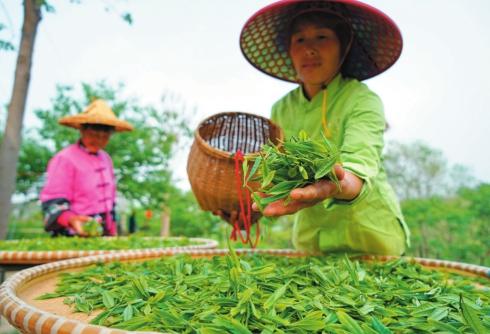
Emergency Training
A volunteer explains fi rst aid skills to students at a middle school in Zaozhuang, east Chinas Shandong Province, on May 8, World Red Cross Day.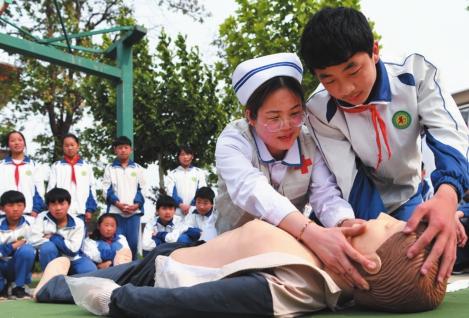
Cultural IPRs
China has strengthened the protection of intellectual property rights(IPRs) of traditional culture, crafts and intangible cultural heritage, according to a report from the Ministry of Culture and Tourism.
In 2018, the Lum medicinal bathing of Sowa Rigpa was included in the Representative List of the Intangible Cultural Heritage of Humanity by the United Nations Educational, Scientifi c and Cultural Organization.
During the same year, a total of 1,082 individuals were newly recognized as representative inheritors of national intangible cultural heritage.
In addition, IPR protection courses were emphasized in the training plan for inheritors of intangible cultural heritage, and 10 workshops for traditional crafts have been set up to provide assistance to local enterprises and workers, said the report.
Winged Dinosaur
Chinese scientists have found the remains of a bizarre Jurassic dinosaur with membranous wings, showing a strange but unsuccessful attempt to fl y in the evolutionary process from dinosaur to bird.
The well-preserved fossil, discovered in northeast Chinas Liaoning Province, dates back 163 million years and belongs to a new species of Jurassic non-avian theropod dinosaur with associated feathers and membranous tissues.
About 32 cm long and weighing about 306 grams, the new species was named Ambopteryx longibrachium, meaning a mixture of a dinosaur and the membranous wings of a pterosaur.
The new discovery belongs to the enigmatic clade of the Scansoriopterygidae, one of the most bizarre groups of nonavian theropods, said Wang Min, a researcher at the Institute of Vertebrate Paleontology and Paleoanthropology of the Chinese Academy of Sciences.
The research was published as a cover story in the May 9 issue of the academic journal Nature.
Second-Hand Cars
China has launched exports of second-hand cars, with Beijing, Tianjin, Shanghai and Guangdong among the fi rst batch of 10 regions allowed to conduct such trade, according to a statement from the Ministry of Commerce (MOFCOM).
The second-hand cars export market has huge growth potential, according to the statement issued on May 6.
Trade offi cially kicked off on May 5 after a guideline was released in late April which required the development of sound inspection and after-sales services for second-hand cars exports.
The MOFCOM will work with the Ministry of Public Security and the General Administration of Customs to improve regulations and services to support the sector, the statement said.
Industrial data showed that about 13.82 million used cars were traded in China last year, less than half of the new vehicles sold.
Another Airport
Workers at the construction site of Chengdu Tianfu International Airport, southwest Chinas Sichuan Province, on May 1. The construction is expected to be completed by the end of this year and put into operation in the fi rst half of 2021, which will make Chengdu the third city to own two international airports besides Beijing and Shanghai.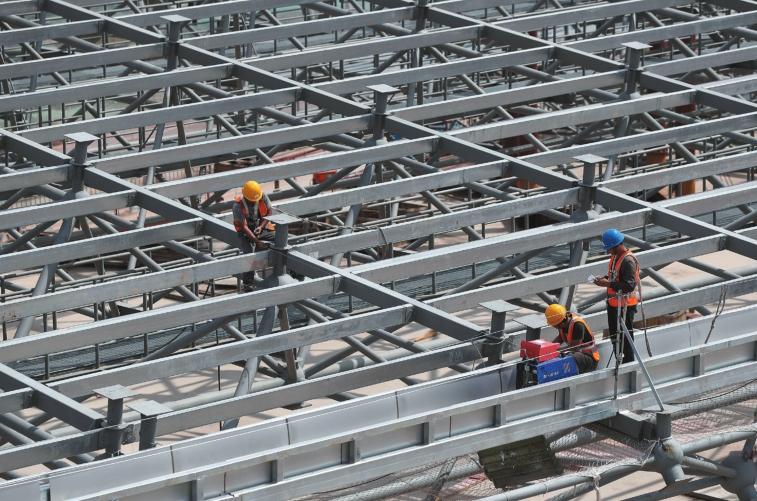
Lower RRR for Banks
China will apply a relatively low reserve requirement ratio (RRR) for some small and medium-sized banks starting from May 15, the central bank announced on May 6.
About 1,000 county-level rural commercial banks will enjoy a favorable RRR of 8 percent, unleashing long-term capital of about 280 billion yuan ($41.6 billion), which will be used as loans to private, micro and small enterprises (MSEs), the Peoples Bank of China said in an online statement.
The favorable ratio will only apply to rural commercial banks that operate at county level, or those banks that have branches in other county-level administrative areas with assets below 10 billion yuan($1.48 billion), the statement said.
The move followed a State Council decision in April to establish a policy framework for applying a moderately low RRR for small and medium-sized banks in a bid to lower fi nancing costs for MSEs.
The stock price of small banks surged after the announcement. Qi ngdao Rural Commercial Bank Corporation saw its share price jump by the daily limit of 10 percent on the news before falling back to rise about 6 percent as of 10:30 a.m.
After Hours
Evening consumption in Beijing during the four-day May Day holiday increased as the capital continues to drive economic growth with what it calls the “nighttime economy.”
The nighttime economy refers to business activities between 6 p.m. and 6 a.m. in the service sector. It appeared in Beijings latest government work report, which urges malls, supermarkets and convenience stores to stay open late.
Revenue of 60 key retailers and restaurants monitored by the municipal commerce bureau reached 3.22 billion yuan ($478 million) during the holiday, up by 6.5 percent compared with the same period last year, according to the bureau.
Restaurant consumption in mall-clustered Wangfujing, Sanlitun and Qingnianlu surged 51.3 percent during nighttime hours compared with the same period last year.
A total of 24 shopping centers have registered nearly 40 percent more visitors during the holiday, the statistics showed.
Beijing has a big market for late-night spending. Data released by Chinese ride-sharing giant Didi Chuxing in 2018 showed Beijing had the largest number of travelers between 10 p.m. and 6 a.m.
Leveling the Field
China expects to further optimize the investment and operating environment for foreign investors in its fi nancial sector with new measures to open the fi eld wider, according to the countrys top banking and insurance regulator.
A total of 12 new rules will be released on the basis of profound research and evaluation, Guo Shuqing, Chairman of the China Banking and Insurance Regulatory Commission(CBIRC) said on May 1.
“These measures will also encourage a stronger presence of foreign investment in the development of Chinas fi nancial sector,” the CBIRC spokesperson Xiao Yuanqi told Xinhua News Agency in an interview.
Detailed rules in regulations for foreign banks and foreign insurance companies have been revised in accordance with the new rules and will be released soon, Xiao said.
The playing fi eld for foreign and domestic companies will be further leveled, said the spokesperson, citing the simultaneous abolishment of upper shareholding limits for a single Chinese-funded bank and a single foreign-funded bank in a Chinese commercial bank, as an example.
At present, the shares of foreignfunded banks and insurance companies total assets have reached 1.64 percent and 6.36 percent, respectively, in China.
According to the new measures, asset requirements for foreign banks to set up foreign-funded legal person banks or branches will also be removed in a bid to further diversify the structure of banking institutions in China.
Summer Fishing Moratorium
A fi sherman sorts nets to prepare for the off season at a fi shing port in Yantai, east Chinas Shandong Province, on May 1. Chinas Bohai Sea, Yellow Sea, East Sea and part of the South China Sea started the off season on May 1.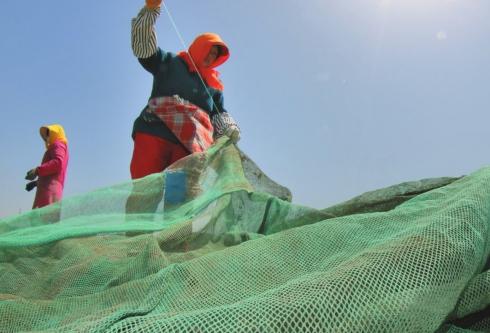
NEV Charging
South Chinas resort island of Hainan has vowed to put in place 940,000 charging poles by 2030 to meet the rising demand for new-energy vehicles (NEVs), local authorities said.
Statistics show that the province has built more than 4,600 charging facilities for electric cars. At the end of 2018, the province had about 23,000 NEVs, 1.8 percent of the total number of the provinces automobiles.
Hainan has sped up the promotion of clean energy vehicles by announcing the ban of fossil-fueled automobile sales throughout the province by 2030. The provincial government will also require all new vehicles for offi cial business to use clean energy from 2019, and all government vehicles, except for cars providing special services, are scheduled to use clean energy by 2028.
New Quotas Approved
Chinas forex regulator said on May 6 that a total of $4.2 billion of quotas were approved for nine Qualifi ed Foreign Institutional Investors (QFII) in April.
The State Administration of Foreign Exchange (SAFE) also approved 9.7 billion yuan ($1.43 billion) of quotas for fi ve Renminbi Qualifi ed Foreign Institutional Investors (RQFII) last month.
Up till now, the country has approved $4.74 billion of quotas for 13 QFII investors this year, exceeding the total quota in 2018.
China approved $24 billion of quotas for 12 RQFII investors during the fi rst four months, more than half of the total quota in 2018.
Chinas currency, the yuan, is convertible for trade purposes under the current account, while the capital account, which covers portfolio investment and borrowing, is largely run by the state in an effort to man- age capital fl ows in and out of the country.
The QFII and RQFII programs, introduced in 2003 and 2011 respectively, allow overseas institutional investors to move money into Chinas capital account for investment.
“Chinas determination to expand opening up and reform measures have made Chinas fi nancial market increasingly appealing to overseas investors,” according to a statement on the SAFEs website.
Data showed that overseas institutional investors bought a net$19.4 billion of Chinese stocks and$9.5 billion of Chinese bonds in the fi rst quarter.
“The SAFE will continue to support the opening up of fi nancial markets, meet demand from overseas investors to expand investment in the markets and attract global long-term capital to enter the countrys fi nancial markets,” said the statement.
Flower Economy
A farmer dries fresh dendrobium stem fl owers in a village of Chishui, southwest Chinas Guizhou Province, on May 4. The plant of dendrobium stem, a valuable herb, has promoted rural revitalization and poverty alleviation in local villages.